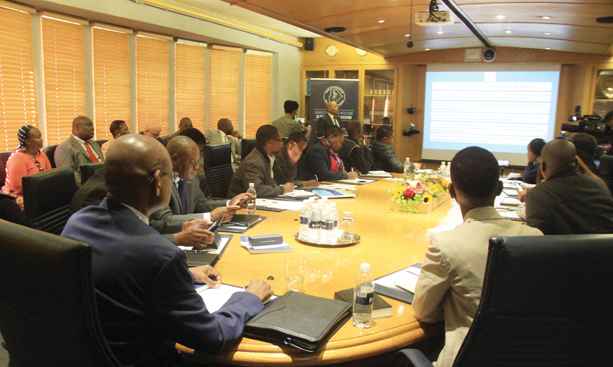Governor of Bank of Botswana (BOB) Moses Pelaelo has decried high unemployment and income inequality levels in Botswana, saying they were impeding economic growth and denying the country the chance to attain high income status.
Pelaelo called for robust structural transformation of the economy to curb factors hindering economic growth. He said this Tuesday when unveiling the 2018 BoB Annual Report.
He said growing the private sector and expanding non-mining sector – especially agriculture – remained a key measure of growth prospects.
In addition, Pelaelo said a study by International Monetary Fund (IMF) on “Growth in Southern Africa: Issues and Reform Options” singled out three factors that continue to detract from growth prospects and transition to high-income status.
He said the first factor is lacklustre relative export performance and tradable sector. In contrast to countries that attained middle income status rapidly in Latin America and South East Asia for example, for Botswana, he said, the private sector’s performance declined as a share of the country’s GDP over recent years.
“The second factor relates to the low or declining total factor productivity, encompassing land, capital and labour. The third impediment factor is relatively large public sector including state-owned enterprises, with the resulting sub-optimal delivery of services, compared to middle-income peers,” he added.
According to Pelaelo, in order to sustain medium to long term prospects for the economy, diversified, inclusive growth, and transition to high–income status, policy should focus on raising potential growth through fiscal reforms.
“Inclusive economic growth is necessary by investing on infrastructural development; enhancing strong financial sector for funding businesses will assist in upgrading current volatile source of revenue being mining and SACU. There is a potential for economic growth which yield more employment opportunities going forward,” Pelaelo said.
No stolen funds
BOB Governor said there is no misappropriation of funds at the central bank as per some recent media reports. He said BOB is not audited by the Auditor General but is currently audited by KPMG in five years contract term.
Director of Research and Stability at BOB, Dr Tshokologo Alex Kganetsano urged the country to consider new financing strategies for industrialisation so as to fully attain high income status.
New financing strategies
Presenting the 2018 BOB annual report theme chapter titled “Financing Strategies for Industrialisation and Transition to High Income Status’’, he said the main sources of revenue being minerals and Southern Africa Customs Union (SACU) need to be diversified.
Dr Kganetsano said Botswana should look into other financing options such as regional banks such African Development Bank (AfDB) as well as international financiers like the International Monetary Fund (IMF).
“Liberalisation of domestic markets for deliberate attraction of FDI in high technology driven sectors by using tax incentives and subsidised direct government funding model is common in countries such as Brazil and Singapore; hence Botswana can also adopt this model of funding to grow the business sector,” he charged.
He said the financing gap in Botswana remains high with weak funding capacity by the Development Finance Institutions (DFIs) such as commercial banks and state-owned enterprises such as CEDA amongst others.
As a result, he said Botswana becomes less competitive in the global economy due to limited access to funding by the possible drivers of economy such as the Small Medium and Micro Enterprises (SMMEs).
Giving financial results and operations of the bank in 2018, Chief Financial Officer Daniel Loeto said global economic activity was modest at 3.7 per cent growth in 2018 compared to 3.8 per cent in 2017, reflecting a slower pace of increase in global market.
He said the bank reached the net income of P2.9 billion in the previous year; reflecting a growth from the P739.5 million in 2017.
